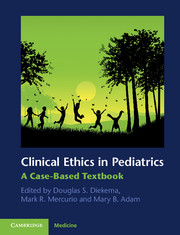Book contents
- Frontmatter
- Contents
- Contributors
- Preface
- Section 1 Core issues in clinical pediatric ethics
- Section 2 Ethical issues at the beginning of life: perinatology and neonatology
- 10 Maternal–fetal conflicts
- 11 Fetal intervention and fetal care centers
- 12 Ripped from the headlines: assisted reproductive technology and multiple births
- 13 Preimplantation and prenatal genetic testing for inherited diseases, dispositions, and traits
- 14 Decision-making in the delivery room
- 15 Withholding and withdrawing life-sustaining intervention from neonates
- 16 The role of quality of life assessments in neonatal care
- 17 Variations of practice in the care of extremely preterm infants
- Section 3 When a child dies: ethical issues at the end of life
- Section 4 Ethical issues posed by advances in medical technology and science
- Section 5 Children, public health, and justice
- Section 6 Special topics in pediatric ethics
- Index
- References
16 - The role of quality of life assessments in neonatal care
from Section 2 - Ethical issues at the beginning of life: perinatology and neonatology
Published online by Cambridge University Press: 07 October 2011
- Frontmatter
- Contents
- Contributors
- Preface
- Section 1 Core issues in clinical pediatric ethics
- Section 2 Ethical issues at the beginning of life: perinatology and neonatology
- 10 Maternal–fetal conflicts
- 11 Fetal intervention and fetal care centers
- 12 Ripped from the headlines: assisted reproductive technology and multiple births
- 13 Preimplantation and prenatal genetic testing for inherited diseases, dispositions, and traits
- 14 Decision-making in the delivery room
- 15 Withholding and withdrawing life-sustaining intervention from neonates
- 16 The role of quality of life assessments in neonatal care
- 17 Variations of practice in the care of extremely preterm infants
- Section 3 When a child dies: ethical issues at the end of life
- Section 4 Ethical issues posed by advances in medical technology and science
- Section 5 Children, public health, and justice
- Section 6 Special topics in pediatric ethics
- Index
- References
Summary
Case narrative
A female baby is delivered unexpectedly at 25 weeks’ gestation following acute placental abruption. She is in poor condition at delivery and requires active resuscitation with endotracheal intubation. Mechanical ventilation is provided over the first 4 days of life. Routine cranial ultrasonography on day 4 indicates a large unilateral intraventricular hemorrhage with evidence of parenchymal infarction.
The findings are communicated to the parents and they are warned that there is a high possibility that the child may develop some form of cerebral palsy. The parents are distressed and horrified by this information. It appears that they have had a lifelong fear of having a disabled child. They state that they are deeply concerned that their child will have a poor quality of life, leading to lifelong distress and suffering. They are also concerned about the likely effect of the child’s disability on the family, and on their marriage. The parents argue that it is morally wrong for aggressive medical interventions to be continued to ensure the survival of a child who will have such a poor quality of life, creating burdens for herself, her family, and to society.
- Type
- Chapter
- Information
- Clinical Ethics in PediatricsA Case-Based Textbook, pp. 89 - 93Publisher: Cambridge University PressPrint publication year: 2011
References
- 1
- Cited by

